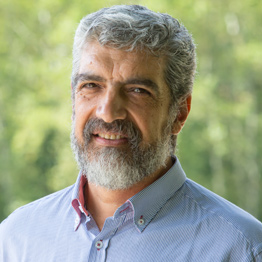09/10/2024
Published in
Diario de Navarra
Diego Maza Ozcoidi
Professor of the School of Sciences of the University of Navarra.
 Although I am not taken by surprise, I must confess to a certain bewilderment. Every year at this time I am forced to strike a balance between the need to reach a wide audience and the intrinsic complexity associated with Nobel Prize-winning frontier physics. This year, by contrast, it might seem obvious and unnecessary to delve into a technology implanted in the collective unconscious as a tool capable of tackling (almost single-handedly) any class problem. Certainly there is some of this, although in my humble opinion, far less powerful than some people believe.and, at the same time, as dangerous or even more dangerous than others think.
Although I am not taken by surprise, I must confess to a certain bewilderment. Every year at this time I am forced to strike a balance between the need to reach a wide audience and the intrinsic complexity associated with Nobel Prize-winning frontier physics. This year, by contrast, it might seem obvious and unnecessary to delve into a technology implanted in the collective unconscious as a tool capable of tackling (almost single-handedly) any class problem. Certainly there is some of this, although in my humble opinion, far less powerful than some people believe.and, at the same time, as dangerous or even more dangerous than others think.
Why the bewilderment? The answer forces me to dive into the complexity that lies at the heart of this technology. The development of neural networks is fundamentally based on a mimetic method, which essentially seeks to replicate the cognitive mechanisms of the human brain by assuming that this capacity is based on its topology, i.e. the way in which different layers of neurons interconnect with each other to achieve a specific purpose. Thus, these correctly "trained" "neurons" are able to interpret the information that "feeds" them and thus provide us with answers to generic questions, even when these are not specifically of the same nature that fed their "learning" process.
At this point, I imagine the reader is somewhat annoyed by the profusion of quotation marks included in the text. However, the cause of my bewilderment lies in them. They are more than necessary in the context of this award because concepts such as learning have never been under the umbrella of what are commonly considered hard sciences such as physics. In fact, the basic mechanisms of the process by which networks of this subject are able to process information (for many "learning") are still obscure enough not to be considered at all a problem even well addressed. There is no doubt that their practical possibilities seem inexhaustible, but their development as a technology does not necessarily imply a better knowledge of the intrinsic (or should I say deterministic?) mechanisms of learning processes (this time without quotation marks).
In my modest opinion, this year's award represents a wake-up call (one more) regarding a technological resource that, surrounded by the aura of rigor that its original formalism imprints on it, now affects humanity on a planetary scale without it having the Degree of control over them as other ideas coming from physics, once imprinted on society.
